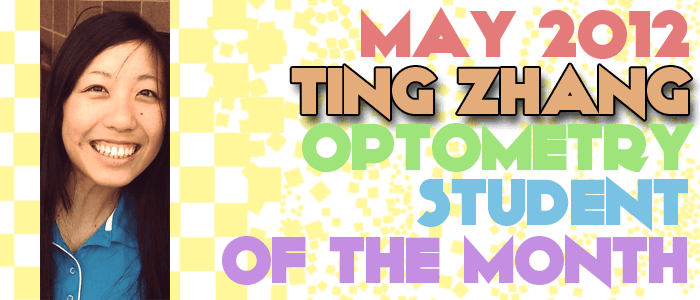Name: Ting Zhang
School: New England College of Optometry
Grad Year: 2015
Congrats on winning Student of the Month! – Please tell us exactly why you won student of the month?
Beginning of the school year, our school held a welcome back barbecue, and different student clubs set up booths to recruit new members. I, like everyone else in my class, was an eager beaver and signed up for nearly all the student clubs. Also I am the president of NECO class of 2015, the best class ever!
I am active in SVOSH. I help with many fundraising efforts and volunteer at the Sharewood clinic, where we provide eye care along side prospective ophthalmology students from Tufts. What I discovered was that a first semester optometry student knew just as much if not more about vision tests and screenings as a 4th year med student.
Last October, the American Academy of Optometry held its meeting at Hynes Convention Center, down the street from our school. They started a new “Student Fellows” program to encourage students to get the most out of the meeting and to eventually become a fellow in the future. I was one of 80 NECO students who obtained the student fellowship.
By far, my favorite club on campus is the Performance Vision Club. We provide vision screenings to college sports teams around Boston. We have experts in sports vision come to our school to give lectures. We visit local sports vision optometrists to see/play with their equipment and learn about this subspecialty. As an added bonus, we do a lot of fun activities like trapshooting, hiking and rock climbing.
Early April, I attended the AOA-PAC conference and spoke with the legislative aides of a few Colorado congressmen about the significance of the National Health Service Corps Improvement Act, HR 1195. Last Friday, I canvassed the Massachusetts state house to ask for support of Senate Bill 2135, a.k.a. the Glaucoma bill.
Can you give a few words of advice to other students out there striving to achieve certain goals while in Optometry school?
There are a lot of opportunities for students during optometry school so take advantage whenever possible (i.e. going to D.C. with AOA-PAC, AAO Academy Meeting, Optometry’s meeting, seminars, continuing ed events, free pizzas, etc.) Reach out to people around you and build a good rapport with classmates, upper-years, professors, deans, staff, and anyone you cross paths with. Having a good network of support will make your experiences during school so much more memorable and make achieving any goals easy.
Where are you from, where did you attend undergrad?
Pueblo, Colorado and I graduated from the University of Colorado at Boulder (Go Buffs!)
What did you study in undergrad, and what ultimately drove you to Optometry?
I graduated with a B.A. in International Relations in 2009. In 2010, I inadvertently walked into someone talking with his arm in full motion and got poked in the eye. It was the worst eye-poke I had ever experienced, and when it was still painfully teary the following day, I went to see an optometrist apprehensively. That is when I realized optometry is a career option, and after nearly two semesters of optometry school, I am amazed at how much better than expected this career choice is for me.
What made you choose your school?
It was love at first sight. The day of my interview at NECO was a fine spring day in late April. The sun beamed high over the Charles River that was bustling with sailboats, kayaks and canoes. Runners, skaters, and cyclists brought the city to life with activity. At the center of it all is a beautifully preserved mansion dedicated to training optometrists with the most diverse patient base of all optometry schools. I almost canceled my interview and missed out on this experience, so my advice to pre-optometry students is to visit as many schools as possible to get a feel for each school and go with the one that you feel good about.
Are you involved in any Optometry organizations, do you hold any special positions at school or have any other creative optometry ventures going on?
I am the president of NECO class of 2015, the best class ever! I don’t have any creative ventures at the moment, but I will be in Germany for a three-week elective course in optics and dispensary work starting May 22, 2012!
What academic subject have you found most interesting in school thus far?
Neuroanatomy. I love all things clinically relevant, and it’s a really fun/interesting class.
What was the most difficult class for you thus far?
Principal and Practices of Optometry, there is a mountain of information cumulative since day 1 of optometry school and lab proficiencies asks you to do so much with so little time.
What was the most difficult clinical skill to learn?
So far, viewing the front and back of the lens with the slit lamp has been a hit or miss for me. It looks so easy when the upper years move the light beam and focus so seamlessly across the eyes while I struggle clumsily with the joystick and the illumination arm.
If you’ve already started seeing patients in clinic, how did you help make the transition from student to intern? What techniques do you utilize to help develop a good rapport with the patients that you see?
I have only been on multiple screenings as first year student. Practice whatever skills that have been challenging and be confident. For the 3 to 11 year olds, you have to be quick and be wacky to get their attention.
Will you be doing a residency? Why or why not?
I would be interested in a residency in ocular disease.
If you could change one thing about Optometry, what would it be?
I would like to increase optometry’s scope of practice to be equal to that of ophthalmology. Ophthalmologists were medical students who knew very little about the eyes prior to their residency. Optometry students know so much more about the eyes and other systemic conditions that present themselves in the eyes before the optional optometry residency. If an optometry student is an interested in surgery during the course of study, I think he or she would be more than qualified for a residency in ophthalmology and train to be a surgeon, retinal specialist, corneal specialist, etc.
How do you feel about the legislative battles surrounding Optometry?
Most professions are legislated; otherwise, there would lack safeguards for the public. The medical industrial complex, however, unfairly dominates optometry’s legislation. Optometry must fight the better-funded lobbying groups that protect the financial interests ophthalmologists. We have strength in numbers. We just need to be better organized and more proactive in the fight for practicing the full scope of our training.
Where do you see yourself practicing after graduation? Where? What type of modality? Are you more interested in research, teaching, organized Optometry, or private practice?
I have accepted the Air Force Health Professions Scholarship and will be fulfilling my commitment as an Air Force optometrist for at least three years. If I enjoy it, I plan to make my career in the Air Force. However, prior to applying for the Air Force HPSP, I wanted to start an optometry clinic at the community health center where I had worked. I would still like to do that to improve care to those facing access barriers.
How will you make Optometry grow as a profession?
I will be active in my community promoting the importance of regular eye examination. I will be active in local and national optometric associations to secure a greater scope of practice for optometry.
What are some things you feel Optometry is lacking? Any ideas to combat this?
Optometry lacks public education. Optometrists need to be more visible and get more involved in their community, and show the public the importance of regular eye check-ups. ASCO sponsors student video contest to show prospective optometry students what optometrists do, maybe AOA can sponsor video contests that shows the general public what optometrists do and start a nation-wide public health campaign.
Optometry also lacks a global standard. Many countries lack the profession altogether while others have greatly reduced scope of practice. It would be beneficial for the public to have an international governing body that works to equalize and improve the standards for optometry so that people everywhere can access the same standard of care from an optometrist.
Are you satisfied with your decision to pursue Optometry? Or can you see yourself doing something else?
The more I learn, the more I am in love with optometry. It was all by luck that I stumbled onto this career track, but now, I don’t think there is anything else besides being a TV host for a show that sends me around the world to eat.
If you had a time machine, what would you change in history and why?
Changing one part of history might have a worse outcome than intended. But if there is an event in history where if it were to occur, all the past human suffering (slavery, war, famine, atom bomb) and all future suffering could be minimized, I’d like to make that happen. As of yet, I’m not sure if such event exists (maybe if Adam did not bite the forbidden fruit?) However, starting now, we can do our part to minimize our negative impact. We can recycle more, eat more sustainably, be more conscientious, treat everyone and everything better, and as Dr. Dori Carlson have said, leave everything better than you find it.
If you could go anywhere in the world for vacation, where would you go?
The Milford Track in New Zealand.
If you were stranded on an island and could only bring 3 things, what would you bring?
Ceramic portable water filter, survival knife, tight-fitting swim goggles
What was your greatest achievement?
After living in Mexico for 2 months, I’ve achieved an iron stomach that is able to stomach almost anything people of another culture would eat without getting sick.
What is your biggest strength / weakness?
Biggest Strength: Happy-go-lucky
Biggest Weakness: Free stuff
What interests you most outside of Optometry?
Traveling to new places, meeting people and experiencing different culture.
You can cure one eye-disease, what would you cure?
If I can only pick one, it would be glaucoma because it’s more prevalent. However, I would love a cure for retinoblastoma because children should not have to suffer so much.
Would you rather be 5D Hyperopic or 6D Myopic? Why?
6D Myope, because I don’t want to be blind near and far when I’m old.
If you discovered/invented an ocular phenomenon or ophthalmic technique would you name it after yourself or would you name it after what it is/does? Why?
Ting is easy enough to remember 🙂



